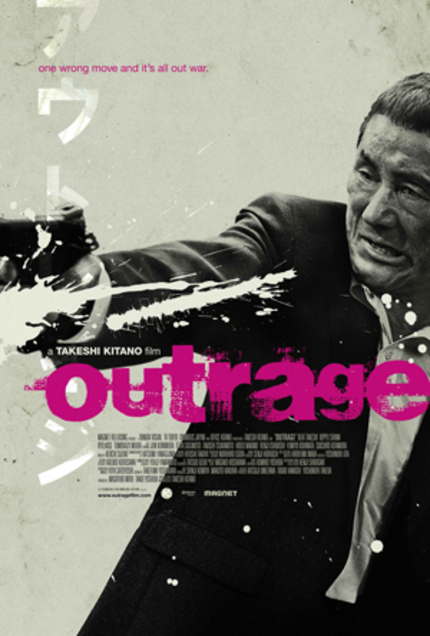AFFD 2011: OUTRAGE Review

That was then.
Now, we have Outrage. While Outrage is a return to the genre that made Kitano a name in the West, it is also a bit of a departure from some of his older Yakuza films. Many of his previous films were fish-out-of-water stories, Yakuza appeared where Yakuza should not be, whether it was an island (Sonatine), or Los Angeles (Brother), but Outrage is all about being inside of the Yakuza and their day to day operations. The film, as explained, is almost tedious in its depiction of Yakuza life. If there were such a thing as a Yakuza procedural, this would be the template.
Outrage is spectacular by its lack of spectacle. Kitano's low-level underboss, Otomo, works as an enforcer of sorts for the higher ups. He takes his orders from a boss who has made an alliance with a competitor that makes his own boss very uncomfortable. The head honcho doesn't like this relationship, and takes steps to make it go away. What begins as a single sentence from the big boss of the Sannokai family, spins into a Yakuza turf war by inches as one small act results in a slightly bigger retaliatory act, and so on and so forth.
There are two things about the film that I found particularly impressive. The first is the utter banality of the calm between the storms in the film. The Yakuza seem to spend the vast majority of their time sitting around in their "office", which is little more than a glorified storage space on enemy turf, waiting for orders. They aren't shaking down the locals, they aren't harassing the police, they are waiting for someone to tell them to do something. Anything. Now, when they get the order, there's no stopping them. Yakuza are not, by nature, relaxed people, so you can imagine all of the pent up energy building as they sit on their asses, and imagine how it is released when they are allowed to pop. The violence is operatic, beautifully shot, and at ties hard to watch, a confrontation in a dentist's office comes to mind, but at the same time brutal and destructive. Then, as quickly as the floodgates opened, they are closed again, and Kitano waits.
This leads me to the second aspect of the film that I found most impressive, Beat Takeshi, the actor. I'm sure it doesn't hurt that Kitano was the director and knew exactly how the role needed to be played, but hot shit, if he didn't nail it. Kitano is the master of the stone face, Buster Keaton's got nothing on him. He waits better than anyone else in his little family, which is probably how he ascended to become the boss of his little troop in the first place. Kitano's cool demeanor is nearly impenetrable, the one thing that betrays him is not really even in his control, his trademark facial tic. Even as he sits by the phone, waiting for the next set of orders to fuck someone's shit up, that tic betrays the vitriol and anger that seethes just beneath the surface, the outrage. It is as if the anger can't be completely bottled, and the slight upturn of his eyelids and cheek are like a steam valve designed to let it out a little bit at a time, lest he should explode in a less controlled manner. For all the the venom he spews when the time comes and it is called for, you never once get the sense that Kitano's Otomo is out of control.
The two hour game of tit for tat is truly engaging and vigorously entertaining. You know that there is always another explosion around the corner, and the game is trying to get a head of it, but you never do. Even as the film closes out, and scores seem settled, they never really are. The viewer understands that this melodrama, this game, will go on and on, like all wars. To the victor go the spoils until someone else decides they want them.
Kitano's direction is, as expected, impeccable, and the film looks wonderful. It may not be a sweeping, epic film, but it is something special, and I'm glad Kitano's finally come home.

Do you feel this content is inappropriate or infringes upon your rights? Click here to report it, or see our DMCA policy.






